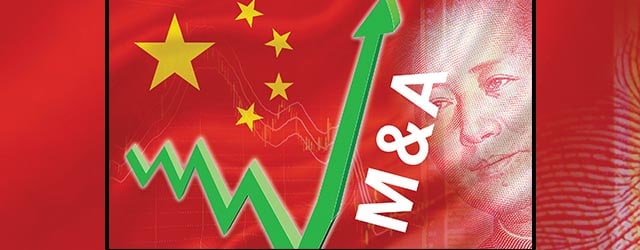In an effort to boost the country’s sagging economic growth, China is consolidating key industries, hoping to make them more efficient ahead of eventual partial privatizations.

This has produced a surge in merger activity, which reached a record $806 billion in China in 2015.
Deals involving Chinese companies drove M&A activity in emerging markets last year, far surpassing second-place South Africa’s $52 billion worth of deals and Brazil’s $45 billion, according to Thomson Reuters. Overall, the total value of deals in emerging markets rose 42% in 2015 from a year earlier, to nearly $1.2 trillion.
China dominated in the number of transactions as well, with a total of 5,751 deals announced last year, while South Africa had 438 and Brazil had 623. Morgan Stanley led the emerging-markets league tables for M&A last year, followed by J.P. Morgan and Goldman Sachs.
In China’s biggest merger of 2015, the country’s three largest telecom carriers—China Mobile, China Unicom (Hong Kong) and China Telecom—sold their telecom towers last October in a joint venture. The deal was designed to reduce duplicate costs.
Earlier in October, Meituan, China’s version of e-commerce marketplace Groupon, and Dianping, a restaurant review smartphone app, agreed to merge to create a $15 billion services platform. The firm will be jointly led by the CEOs of Alibaba, which backs Meituan, and Tencent Holdings, which backs Dianping.
In December 2015, PetroChina, the listed arm of China’s state-owned oil company, created a new pipeline unit by combining three subsidiaries and restructuring assets, in a deal valued at $10.9 billion. PetroChina, which produces two-thirds of China’s natural gas, is expected to divest more noncore assets.
These deals followed a decision by China’s cabinet last August to restructure state-owned companies and to direct two sovereign wealth funds to invest in them. Meanwhile, the government is encouraging Chinese companies to invest overseas to acquire new technology and to become more competitive in global markets.
China’s outbound M&A rose to a record $112 billion in 2015, surpassing the $100 billion mark for the first time, according to Dealogic. The largest outbound deal was China National Chemical’s $7.7 billion acquisition of a controlling stake in Italian tire manufacturer Pirelli.
The majority of M&A activity relates to the domestic Chinese market, but inbound strategic buyers remain active, according to PwC. The turbulence in Asian markets won’t necessarily slow merger activity in China, which is driven by reform of state-owned enterprises and an active private equity market, says David Brown, leader of PwC’s M&A transaction services business in China, Hong Kong and Asia-Pacific. “Private equity is an alternative source of capital,” he says.
More and more, Chinese financial investors are working closely with private equity firms on M&A transactions abroad with Chinese-listed companies, PwC says. As Chinese firms continue to seek foreign acquisitions and the government encourages domestic restructurings, the merger market remains strong.



